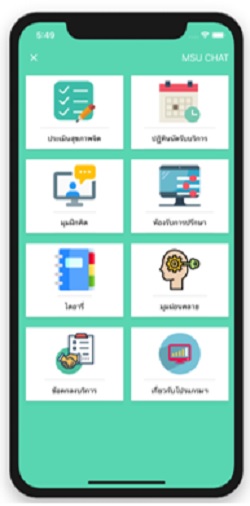DEVELOPMENT OF THE MENTAL HEALTH APPLICATIONS FOR ONLINE INDIVIDUAL COUNSELING TO REDUCE ADOLESCENTS’ STRESS
DOI:
https://doi.org/10.14456/nrru-rdi.2022.57Keywords:
Mental health application, Cognitive behavioral adjustment, Online individualized counseling programAbstract
Using applications as a tool to expand counseling channels may help alleviate mental health symptoms and improve the mental well-being of adolescents. This study’s research objectives were based on developing the mental health application for online individual counseling, and comparing stress scores before and after online individual counseling. Two groups totaling 15 respondents were selected by a purposive method, namely 5 experts and 10 voluntary experimental participants. The research instruments were an online individual counseling program, using a suitability assessment form for mental health applications, the Department of Mental Health SPST-20 stress scale, and an evaluation questionnaire with a mean content accuracy of 3.20. Data were collected by a group of experts to assess suitability, the experimental group measurements, and the single group research, before and after 5, 45-minute sessions. Data were analyzed using the descriptive statistics of percentage, mean, and the inferential statistical difference Z test. The study found that to improve mental health applications, the program of mental health assessments should display a menu of activities that counselors may consider as suitable, along with a service calendar, thinking corner, consulting room, diary, relaxation corner and a service agreement. The experimental group had lower stress levels after using online and individual counseling. Thus, mental health applications have features and characteristics that are truly in line with the demands for use in the world of contactless technology.
References
Bakker, D., & Kazantzis, N., Rickwood, D., & Rickard, N. (2016). Mental Health Smartphone Apps: Review and Evidence-Based Recommendations for Future Developments. JMIR Ment Health, 3(1), 1-31.
Campbell, D., & Stanley, J. (1963). Experimental and Quasi-Experimental Designs for Research. London : Houghton Mifflin.
Chanadrashekar, P. (2018). Do Mental Health Mobile Apps Work: Evidence and Recommendations for Designing High-efficacy Mental Health Mobile Apps. mHealth, 4(6), 1-4.
Chanthaniyom, K., Koolnaphadol, P., & Wongtheerathorn, D. (2020). The effects of online individual counseling based solution focused brief therapy on work-related stress of employees. Journal of Educational Measurement Mahasarakham University, 38(10), 114-126. (In Thai)
ComError. (n.d.). Difference between Android and iOS. Personally interesting features of each system. Retrieved May 7, 2021, from https://comerror.com/andriod-ios.html (In Thai)
Departmant of Mental Health. (2016). The results of the survey of the intelligence level of Thai students in 2016. Bangkok : Departmant of Mental Health, Ministry of Public Health. (In Thai)
Fusikul, N. (2017). The consultation results of reducing stress online in undergraduate students for Faculty of Education, Chiang Mai University. Research report. Chiang Mai University, Chiang Mai. (In Thai)
Hwang, W. J., Ha, J. S., & Kim, M. J. (2021). Research Trends on Mobile Mental Health Application for General Population : A Scoping Review. International Journal of Environment Research and Public Health, 18(5), 1-18.
Iamsiriwong, O. (2012). System Analysis and Design (Revised editions). Bangkok : Se-education. (In Thai)
Jueaginda, S. (2020). Effects Of Individual Counseling Programs For Enhanceing Social Intelligence To Reduce Bullying Behavior Among Lower Secondary School Students. Dissertation, Doctor of Philosophy Program in Applied Psychology, Behavioral Science Research Institute, Srinakharinwirot University, Bangkok. (In Thai)
Kaewkangwan, S. (2011). Theory of Personality Psychology. Bangkok : Mo-Chao-Ban. (In Thai)
Kaewkangwan, S. (2015). Comtemporary Personality Psychology and Psychotherapy. Bangkok : Mo-Chao-Ban. (In Thai)
Kelly, F. P. (1979). Reversibility and stochastic networks. Chichester : John Wiley.
MSU Chat. (2021). http://www.msu.chat. Retrieved May 21, 2021, from http://www.msu.chat (In Thai)
Paoin, W. (2017). Thailand Health 4.0 challenges and opportunities. Journal of the Thai Medical Information Association, 1, 31-36. (In Thai)
Phongsopa, W. (2007). Adjustment on Well-Being Life in the Critical Millennium. Journal of Education, 8(1), 80-86. (In Thai)
Pongsopha, W., & Pongsopha, P. (2014). Theories and techniques of counseling. Bangkok : Chulalongkorn University Press. (In Thai)
Rachyla, I., Pérez-Ara, M., Molés, M., Campos, D., Mira, A., Botella, C., & Quero, S. (2018). An internet-based intervention for adjustment disorder (TAO): study protocal for a randomized controlled trial. BMC Psychiatry, 18(161), 1-10.
Radovic, A., Vona, P., Santostefano, A., Ciaravino, S., Miller, E., & Stein, B. (2016). Smartphone Application for Mental Health. Cyberpsychology, Behavior, and Social Networking, 19(7), 465-270.
Sicgel, A. F., & Morgan, C. J. (1996). Statistics and Data Analysis (2nd ed.). New York : Jonh Wiley & Sons.
Sariwat, L. (2017). Counseling Theory and Techniques. Bangkok : Odeon Store. (In Thai)
Srisa-ard. (2003). Research for teachers. Bangkok : Suwiriyasan. (In Thai)
Stawarz, K., & Preist, C., & Tallon, D., & Wiles, N., & Coyle, D. (2018). User Experience of Cognitive Behavioral Therapy Apps for Depression: An Anlysis of App Functionality and User Reviews. Journal of Medical Internet Research. 20(6), 1-15.
Suansaranrom Hospital. (2020). Manual for screening assessment and health problems form. Surat Thani : Nursing mission group, Suansaranrom Hospital. (In Thai)
Thapinta, D. (2015). Cognitive Behavior Counseling. Nersing Journal, 42(Supplement), 205-213. (In Thai)
Vongtangswad, S., & Tuicomepee, A. (2017). Wellness Enhancement in Undergraduates through Chat-Based Individual Online Counseling. Journal of Behavioral Science for Development (JBSD), 9(2), 56-72. (In Thai)
Wasil, A. R., Gillespie, S., Schell, T., Lorenzo-Luaces, L., & Derubeis, R. J. (2021). Estimating the real-world usage of mobile apps for mental health: development and application of two novel metrics. World Psychiatry, 20(1), 137-138. DOI:10.1002/wps.20827
World Health Organization. (2019). Adolescent health. Retrieved April 6, 2021, from https://www.who.int/health-topics/adolescent-health
Zack, J. S. (2004). Technology of online counseling. In R. Kraus, J. Zack, & G. Stricker (Eds.), Online counseling: A handbook for mental health professionals (pp. 93-121). San Diego, CA : Academic Press.

Downloads
Published
How to Cite
Issue
Section
License

This work is licensed under a Creative Commons Attribution-NonCommercial-NoDerivatives 4.0 International License.




